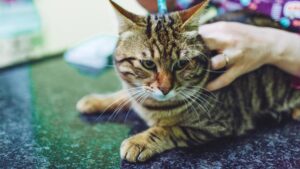How UK Vets Use CBD Oil to Support Cat Health and Wellbeing

In recent years, CBD oil has emerged as a potential tool for supporting the health and wellbeing of cats, particularly when it comes to managing anxiety, pain, and age-related conditions. While research is still developing, many UK vets are cautiously exploring the use of CBD as part of a wider care strategy, especially for cases where traditional treatments have limitations or side effects.
But how do vets actually use CBD in practice, and what should cat owners know before considering it?
CBD for Cats: What the Science (and Vets) Are Saying
Though still an emerging field, early research and anecdotal veterinary evidence suggest that CBD may help with:
- Chronic pain and arthritis
- Anxiety and stress-related behaviours
- Seizure management
- Appetite stimulation
- General inflammation
Importantly, CBD is not a cure-all — but many vets see it as a supportive option, especially in older cats or those with complex conditions. In the UK, any CBD product given to animals is considered a veterinary medicine and must be prescribed under veterinary supervision.
How Vets Use CBD Legally in the UK
The Veterinary Medicines Directorate (VMD) classifies CBD for pets as a prescription-only product. This means:
- CBD cannot be sold or labelled “for cats” without a veterinary medicine marketing authorisation (which no product currently holds in the UK).
- Only a vet can prescribe CBD for a cat, using a human-labelled product under the “prescribing cascade.”
- Products must be THC-free, as even small amounts of THC can be toxic to cats.
Because of this legal framework, reputable brands provide human CBD oils that are safe for feline use — and vets carefully guide dosage and administration. For example, a trusted product like CBD Oil for Cats meets veterinary expectations by offering zero-THC formulas blended with cat-friendly carriers like salmon oil.
What Kind of Products Do Vets Recommend?
When a vet decides CBD may be appropriate, they’ll typically suggest:
- Broad-spectrum or isolate CBD oils with 0% THC
- Carrier oils like MCT or fish oil, which improve absorption and palatability
- Low starting doses, usually 1–2 mg of CBD per kg of body weight per day, adjusted based on the cat’s response
Cats are extremely sensitive, so any CBD regimen should start slowly and be closely monitored for changes in appetite, mood, or mobility.
The Role of Owner-Vet Communication
Successful use of CBD in feline care depends on open, ongoing communication between cat owners and vets. This includes:
- Discussing existing medications to avoid interactions
- Monitoring for side effects like lethargy or gastrointestinal upset
- Adjusting dosage based on the cat’s age, weight, and condition
As more evidence emerges and regulations evolve, many vets are hopeful about CBD’s role in feline health — but always within a framework of careful, responsible use.
Final Thoughts
CBD oil is becoming an increasingly discussed topic in UK veterinary clinics, particularly for older cats or those struggling with pain, anxiety, or inflammation. While it’s not a first-line treatment, it can be a valuable tool when traditional options fall short.




